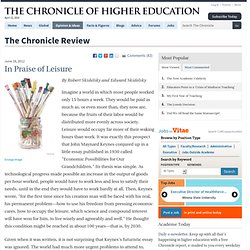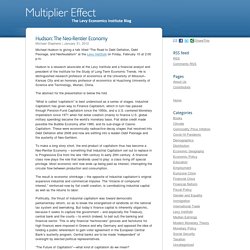

Event Calendar - Does Capitalism Have a Future? Why are Cash-Rich Companies Being Subsidized by Tax-Poor Governments? The latest Q3 US national accounts data shows profits as a share of GDP are at historical highs.

Meanwhile household’s share is at all time lows (see chart). Will pressure from the electorate force to address this imbalance? In the UK, we witnessed just what SocGen described as “the public lynching of Starbucks, Amazon and Google” as public ire has shifted “very swiftly from banker bashing to corporate bashing.” Forget the official tax rate, and look at the actual tax dollars US and European companies have been paying. Societe Generale warns that there is risk to these rates going forward — and that could have implications for profitability.
Lectures, talks & resources... In Praise of Leisure - The Chronicle Review. By Robert Skidelsky and Edward Skidelsky Imagine a world in which most people worked only 15 hours a week.

They would be paid as much as, or even more than, they now are, because the fruits of their labor would be distributed more evenly across society. Leisure would occupy far more of their waking hours than work. It was exactly this prospect that John Maynard Keynes conjured up in a little essay published in 1930 called "Economic Possibilities for Our Grandchildren. " Its thesis was simple. Given when it was written, it is not surprising that Keynes's futuristic essay was ignored. He asked something hardly discussed today: What is wealth for? We in the West are once more in the midst of a Great Contraction, the worst since the Great Depression. The first defect is moral. Second, the crisis has exposed capitalism's palpable economic problems. So let us imagine that everyone has enough to lead a good life. Let's begin by pondering the reasons for the failure of Keynes's prophecy.
Aftermathproject. The Crisis. How did we get here? perspectives... The Financialization of the world economy. Fault Lines... Inequality...
Alternatives to 'market liberal' gobalization? Debating the future of capitalism - reading... Hudson: The Neo-Rentier Economy « Multiplier Effect. Michael Hudson is giving a talk titled “The Road to Debt Deflation, Debt Peonage, and Neofeudalism” at the Levy Institute on Friday, February 10 at 2:00 p.m.

Hudson is a research associate at the Levy Institute and a financial analyst and president of the Institute for the Study of Long Term Economic Trends. He is distinguished research professor of economics at the University of Missouri–Kansas City and an honorary professor of economics at Huazhong University of Science and Technology, Wuhan, China. The abstract for the presentation is below the fold. “What is called “capitalism” is best understood as a series of stages. Industrial Capitalism has given way to Finance Capitalism, which in turn has passed through Pension-Fund Capitalism since the 1950s, and a U.S. To make a long story short, the end product of capitalism thus has become a Neo-Rentier Economy – something that Industrial Capitalism set out to replace in is Progressive Era from the late 19th century to early 20th century.